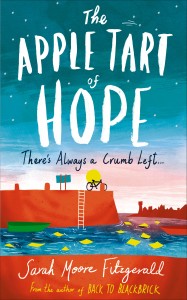Hachette/Orion Children's, RRP $15.95
Apr 2015
 Although I am not a teenager anymore, I was drawn to The Apple Tart of Hope by my love of fantasy and the promise of magic its title evoked.
Although I am not a teenager anymore, I was drawn to The Apple Tart of Hope by my love of fantasy and the promise of magic its title evoked.
The Apple Tart of Hope was slow to begin and hit its straps, but ultimately delivered the slice of magic I yearned for. Although it is not magic in the fantasy sense, the ‘magic’ is in the resolution of the twists and turns, which happen in the relationship between the star-crossed central characters of Meg and Oscar. Meg returns from New Zealand to discover her best friend, Oscar, maker of the eponymous apple tart, is missing, presumed dead. She holds on to hope, refusing to accept her friend’s apparent demise, and goes in search of answers. Through her inquiries Meg discovers that a new girl in town, Paloma (who has been rocking the boat it turns out) holds a clue to Oscar’s disappearance.
The plot is driven by the misunderstandings that arise from teenage timidity, awkwardness, jealousy and vindictiveness that can lead to serious consequences. The universal themes of unrequited love, grief, loss, separation, bullying and suicide are magnified by the lens of teenage angst. Whilst such experiences can stay with us for a lifetime the intensity of the teenage years brings them into sharp relief.
The beautifully woven story engrossed me and left me wanting to see how the increasingly knotted state of affairs was going to be resolved. My indignation at a cruel and vindictive teenage act and my wishing that it be righted spurred me to read on. And I’m very glad I did, to ultimately find those wonderful moments of magic and joy in the world of teenage angst.

